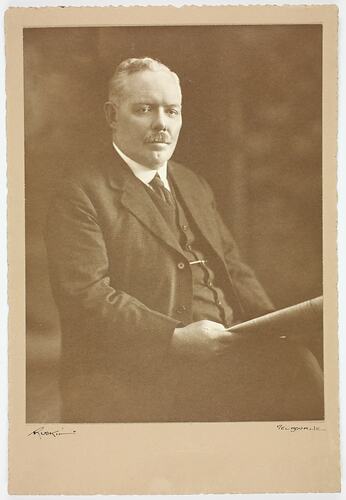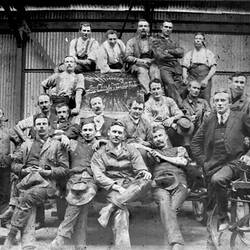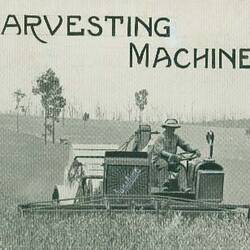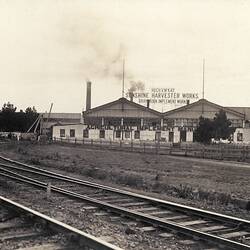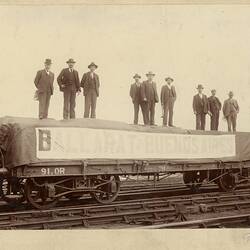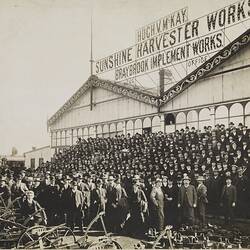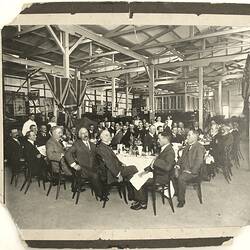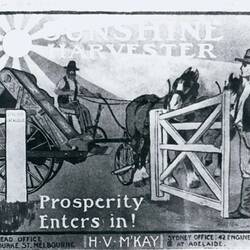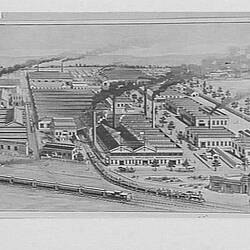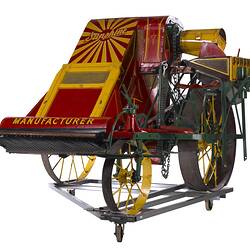I am a married woman living in Bay Street, Port Melbourne. I have six children. My husband is secretary to the Agricultural Implement Makers' Union. I do not know what he earns but he gives me £2-10-0 [two pound, ten shillings] a week. This is not enough to keep the family going. Kate Russell, Testimony 1907 Ex parte HV McKay Harvester Case, Federal Court Arbitration and Conciliation.
It was 1907, and the money that Kate Russell struggled to keep a family on was considerably more than the average wage paid to labourers at H.V. McKay's Sunshine Harvester Works. Back then, agriculture was one of Australia's main industries, and it relied heavily on the machinery produced by companies like McKay's. His harvesters sold not just in Australia but around the world. There was a growing belief that, as the country prospered; living standards should improve for everyone. But under Australia's Federal constitution, the government had no direct power to interfere in matters of wages and working conditions. One thing the government could do - and did - was to impose a tax on agricultural machinery. A local manufacturer like McKay could avoid the tax if his workers received 'fair and reasonable' wages. McKay duly applied for exemption. But the union argued that he did not pay 'fair and reasonable' wages. And so it became a test case: a landmark attempt to balance the interests of an industry against those of the individual worker.
Justice H.B Higgins heard the case in the newly formed Commonwealth Conciliation and Arbitration Court in Little Lonsdale Street. The hearing took place from October 7 to November 8, 1907. Justice Higgins heard that the average wage of unskilled labourers - the lowest-paid of McKay's workers - was six shillings a day, or 36 shillings a week. After hearing from workers as to their wages and conditions he declared: 'now, I want to find out whether these wages are sufficient. No one can give better evidence as to the way the shoe pinches, if it does pinch, than the working man's wife.' Some wives did not appear in person, but prepared lists for their husbands to present in court.
Justice Higgins's 'Harvester Judgement' set the first national wages standard. The wage for unskilled labourers was set at seven shillings a day (up from six), with an extra allowance for overtime. This was a 27% increase on the average low-paid salary and set a safety net for wages for the next century.
Media was divided over the Higgins judgement. On November 14, 1907, 'The Worker' declared the Higgins Judgement "momentous". The Argus of November 11, 1907 was less supportive: 'in practice, Commonwealth regulation of wages was bound to do injustice and grave injury to industry - the 7 shillings per day for unskilled labourers - will be used as a justification for demanding higher wages over a wider industrial are than that which it actually applies.'
Ultimately McKay refused to pay the excise tax and appealed the decision. In 1908 the High Court found Higgins's decision constitutionally invalid because the legislation was essentially concerned with the regulation of employment conditions, a power not held by the Commonwealth Parliament and not capable of being supported by the excise power.
Notwithstanding that victory, the 1907 Harvester Judgement was regarded as a benchmark in Australian industrial case law. Higgins regarded the minimum wage as sacrosanct and applied the Harvester reasoning to subsequent judgments in his long and distinguished career as president of the Conciliation and Arbitration Court.
For most of the twentieth century, Australia would lead the world in setting standards of living. The Harvester Judgement marked the starting-point.
Further Reading
P.G. McCarthy, 'Justice Higgins and the Harvester Judgement' in Jill Roe (ed) Social Policy in Australia 1901-1975, Cassell, 1976
Stuart Macintyre, 'Neither capital nor labour : the politics of the establishment of arbitration', Foundations of arbitration: the origins and effects of State compulsory arbitration, 1890-1914, edited by Stuart Macintyre and Richard Mitchell, Melbourne. Oxford University Press, 1989
Mark Hearn, 'Securing the man: narratives of gender and nation in the verdicts of Henry Bournes Higgins', Australian Historical Studies, Melbourne: University Press, Vol. 37, No. 127, 2006. pp. 1-24.
Edna Ryan and Anne Conlon, 'Help or hindrance?: attitudes to women workers 1900-18', in Gentle invaders: Australian women at work, Melbourne: Penguin, 1989. ch. 3, pp. 50-85.
Charles Fahey and John Lack, 'A kind of Elysium where nobody has anything difficult to do: H.B Higgins. H.V. McKay and the agricultural implement makers, 1901-26', Labour History, Number 80, May 2001. pp. 99-119.
Stuart Macintyre, 'A Fair wage', Winners and losers: the pursuit of social justice in Australian history, Sydney: Allen & Unwin, 1985. ch. 3, pp. 40-58. Extract from the Harvester Judgement.
H B Higgins (1907). Ex parte HV McKay (Harvester Case), (1907) 2 CAR 1. Law Internet Resources. Parliament of Australia, Parliamentary Library. Retrieved on 2008-20-02.
More Information
-
Keywords
Advertising Signs, Agricultural Equipment, Agricultural Equipment Dealers, Agricultural Implement Works, Agricultural Implements, Agricultural Machinery, Agricultural Shows, Agricultural Workers, Agriculture, Assembly Lines, Auto Header Harvesters, Backhoes, Building & Construction, Building Sites, Cane Harvesters, Combine Harvesters, Construction Equipment, Crop Processing Equipment, Crops, Cultivating Equipment, Cultivators, Display Windows, Earthmoving Equipment, Excavation Equipment, Factory Construction, Farmers, Farms, Foundries, Foundry Equipment, Front End Loaders, Grain Harvesting Equipment, Harvesters, Hay Making Equipment, Header Harvesters, Horsedrawn Implements, Industrial Design, Innovation, Innovations, Inventions, Machine Tools, Machinery Dealers, Machinery Displays, Manufacturing, Manufacturing Workers, Manufacturing Works, Metal Presses, Milking Equipment, Milking Machines, Motor Cars, Motor Trucks, Motor Vans, Motor Vehicles, Occupational Health & Safety, Petrol Engines, Reaper-Binders, Royal Melbourne Show, Rural Landscapes, Seed & Fertilizer Drills, Showgrounds, Showrooms, Spraying & Dusting Equipment, Structural Steelwork, Sustainable Agriculture, Tractors, Tractors Attachments, Warehouses, Windmills, Workers, Working Life
-
Localities
-
Authors
-
Article types
